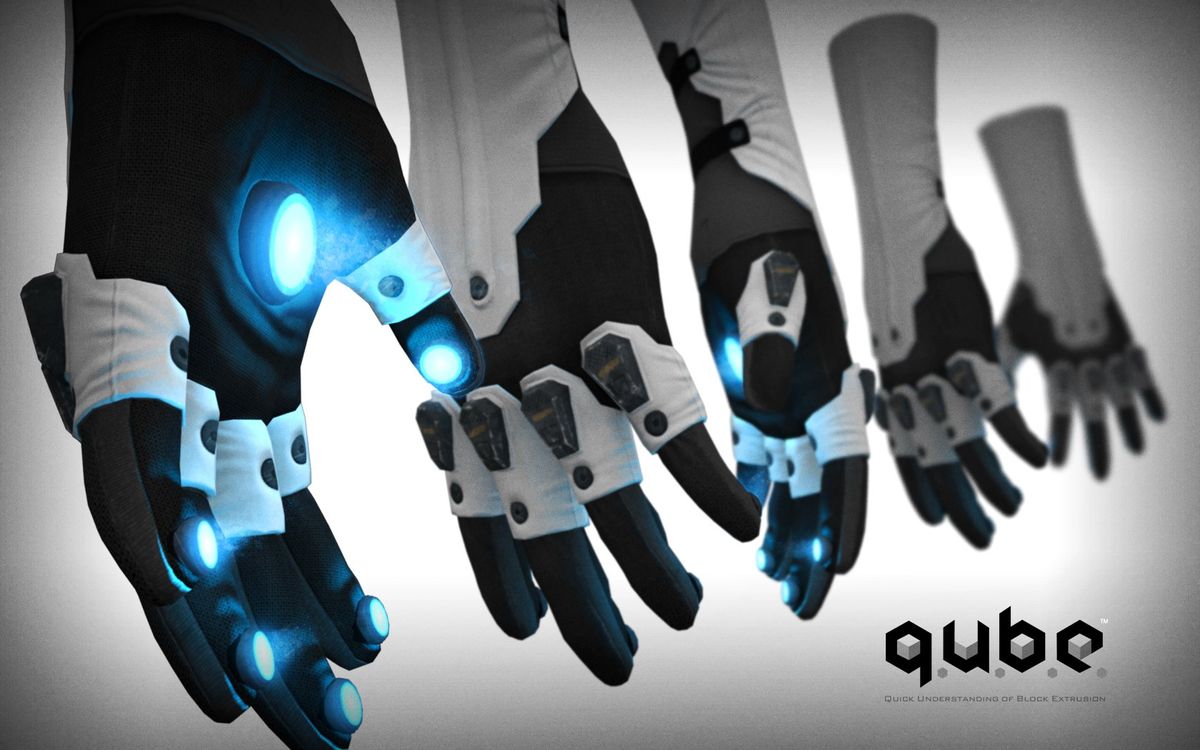The original released back in 2011 for PC and eventually made its way to Steam, OSX, Oculus Rift and even Nvidia Shield. Toxic teamed up with indie outlet Grip Games for the Xbox One version, which has arrived via the ID@Xbox program.
Q.U.B.E. is most frequently compared to Portal, for its first person view and clinical setting. The Director's Cut brings in the game's time trial DLC and includes an expanded narrative penned by Rob Yescombe of Alien: Isolation fame.
So is this just a simple Portal knock-off? Or does Q.U.B.E. stand up for itself in an increasingly busy Xbox indie scene?
Setting & Story
For me, Portal is the quintessential story-based puzzle game. Valve weaved the game's signature portal-hopping mechanics meticulously with the game's setting and story, driving the player forward with as much a sense of intrigue as reward. On the story side of things, I'd say Q.U.B.E. does a pretty great job of emulating that.
At the beginning of the game, you're told that you've been knocked out cold for the past two weeks. You're on a mission to prevent a gigantic alien structure from slamming into the Earth, and your only guidance comes from International Space Station astronaut. Your suit was damaged in the landing, meaning that you can only receive communications in. The ISS astronaut warns you that you might be suffering from amnesia, she presses you to solve the odd puzzles inside the structure regardless, as they might be the only way to save Earth.
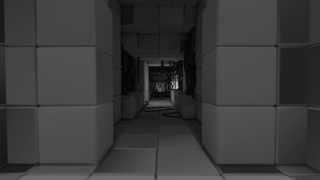
As you solve the games puzzles, you're informed that the structure is falling apart from the outside, but another character radios in to warn that not all is at it seems.
The eerie paranoia that filters through the game's narrative is reminiscent of claustrophobic sci-fi flicks like Solaris and 2001: A Space Odyssey. As mentioned earlier, the story and dialogue was penned by Rob Yescombe, who worked on Alien: Isolation and Crysis. While the story is brief, I felt genuinely intrigued to see how events would pan out. The voice actors do a great job of adding emotion to the experience, despite the sterile setting and absence of character models.
Q.U.B.E.'s story mode will set you back around 1.5-3 hours depending on how fast you solve the game's puzzles, which is a shame - purely because I was enjoying the dialogue. Q.U.B.E. lacks the charm of Portal, but makes up for it with its paranoid intrigue. The cohesiveness of its atmosphere impressed me, with psych ward like celled interiors, ominous music and emphatic dialogue, but the length left me feeling a tad unsatisfied.
Q.U.B.E. Director's Cut is more than its story, though, as we'll look at next.
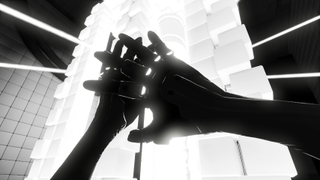
Gameplay
Q.U.B.E. Director's Cut may look like Portal at face value, but at the core they are quite different. In Q.U.B.E, your gloves allow you to manipulate coloured objects throughout the game's various challenges. There's a standard pattern to follow - blue blocks act like spring boards, red blocks can be extended outwards, and yellow blocks can form steps. It seems simplistic early on, but the difficulty ramps up fairly quickly as more and more puzzle elements get introduced.
Some involve using the purple block to spin around entire segments of a room, tasking you to roll and position a ball into a specific place. Getting the ball from A to B might involve all sorts of additional mechanics, like using the red blocks to form bridges, using the blue block to bounce the ball or having the ball roll down a set of yellow block stairs. These are just a few examples, but there's plenty of variety to be found throughout the campaign.
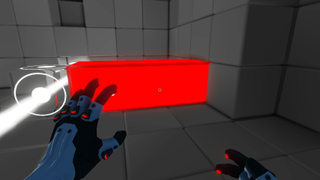
Q.U.B.E. is divided into seven sectors, each with their own puzzle-solving theme. One sector is all about the aforementioned ball rolling, another is about positioning coloured lasers using movable prisms, and another takes place in the dark - allowing you to light up only one coloured block type at a time. Similar to Portal, as the Q.U.B.E. breaks apart from all your puzzle solving skills, the game begins to incorporate the environment into the solutions, such as using the blocks to smash obstacles and so on. The campaign offers a solid array of variety despite its minimalistic premise, but as mentioned earlier, it's a tad on the brief side.
I didn't find any of the campaign puzzles to be overly challenging, difficulty-wise I'd place it in-line with other similar first-person puzzlers.
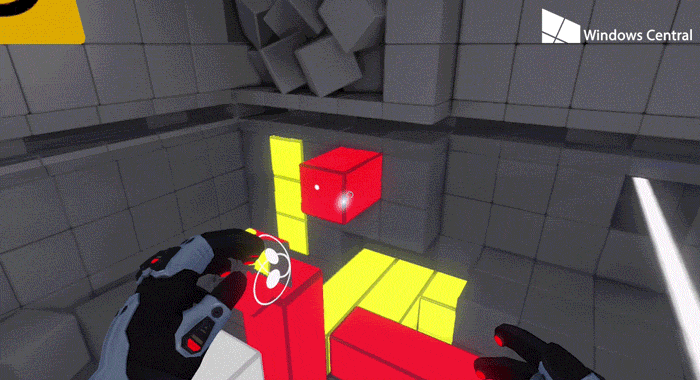
The puzzles task your logical mind, but the few that do require quick reflexes are often annoying. There's no way to adjust the joystick sensitivity for the Xbox One controller, which makes aiming the cursor cumbersome. The physics are often on the quirky side too. Objects frequently got stuck on other objects as I was playing, and there were a couple of instances where I fell through the floor. In a game that has been out on PC for so long, I'd expect bugs like this to have long been squashed. Occasionally I discovered the solution to a puzzle long before I was able to complete it, as I was fighting the game's inconsistent physics rather than the puzzle itself.
Despite the problems, and that Q.U.B.E.'s puzzles perhaps lack the ambition and intricacies of Portal, combined with its narrative I found Q.U.B.E.'s campaign thoroughly entertaining.
Beyond the campaign, Q.U.B.E. Director's Cut bundles in its Against the Qlock DLC, which pads the amount of gameplay you'll get from your purchase significantly. Each trial features Xbox Live leaderboards as well, bringing additional incentive for those inclined. The Qlock trials have fresh mechanics, such as power-ups that lower gravity or increase your speed. The power-ups allow you to complete the trials far faster than you would without, allowing you collect gold, silver or bronze medals depending on your performance. Unlocking levels in this mode require you to obtain a certain amount of medals, similar to games like Trials Fusion.
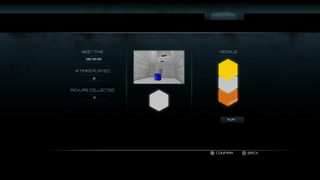
There are no achievements for completing the Qlock trials, which is a bit odd. The vast majority of the game's achievements come from solving puzzles in the brief campaign mode, either from solving sectors or finding hidden secrets. I'd argue that Q.U.B.E. is among the easiest 1000 Gamerscore you can get.
Final Words
Q.U.B.E. Director's Cut is a solid indie puzzler, delivering an intriguing plot on top of some decent mind-bending challenges. This indie game stands unashamed in Portal's big-budget shadow and does so with confidence.
There are some problems with the physics, and for a game that's been out for so long I would've preferred more polish, but the game is so brief that many of you might not even notice these problems. If you venture into Q.U.B.E.'s Against the Qlock time trials, you may find yourself addicted to its frantic thought-puzzles. Others, however, may find themselves annoyed that they're limited by a sluggish joystick speed that cannot be altered.
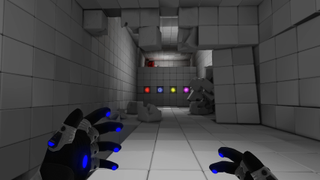
Problems aside, there's an enticing spark of cohesiveness between Q.U.B.E.'s atmosphere, writing, gameplay and setting. It left me wanting to revisit the clinical and paranoid environs of great space-thrillers like Moon. I'm not sure if I should come away from a puzzle game wanting to watch a movie, but Q.U.B.E. certainly leaves an impression.
Q.U.B.E. is a little thin on content, but considering it carries a price tag of just $9.99 / £7.99, it comes in at pretty great value for puzzle game fans. If you enjoyed Portal, I enthusiastically recommend Q.U.B.E. Director's Cut.
Q.U.B.E. Director's Cut is out now on PC, Xbox One, PS4 and PS3.

Jez Corden is the Executive Editor at Windows Central, focusing primarily on all things Xbox and gaming. Jez is known for breaking exclusive news and analysis as relates to the Microsoft ecosystem while being powered by tea. Follow on Twitter (X) and Threads, and listen to his XB2 Podcast, all about, you guessed it, Xbox!
